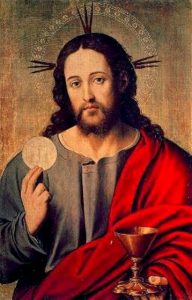
5 August 2018
18th Sunday in Ordinary Time

‘The Saviour with the Eucharist’ (detail) By Juan de Juanes (1545) Del Prado Museum, Madrid, Spain
Readings at Mass
1st: Exodus 16:2-4,12-15
Ps: 77:3-4,23-25,54
2nd: Ephesians 4:17,20-24
Gospel: John 6:24-35
It is my Father who gives you the bread from heaven; I am the bread of life
When the people saw that neither Jesus nor his disciples were there, they got into boats and crossed to Capernaum to look for Jesus. When they found him on the other side, they said to him, ‘Rabbi, when did you come here?’ Jesus answered: ‘I tell you most solemnly, you are not looking for me because you have seen the signs but because you had all the bread you wanted to eat. Do not work for food that cannot last, but work for food that endures to eternal life, the kind of food the Son of Man is offering you, for on him the Father, God himself, has set his seal.’ Then they said to him, ‘What must we do if we are to do the works that God wants?’ Jesus gave them this answer, ‘This is working for God: you must believe in the one he has sent.’ So they said, ‘What sign will you give to show us that we should believe in you? What work will you do? Our fathers had manna to eat in the desert; as scripture says: He gave them bread from heaven to eat.’ Jesus answered: ‘I tell you most solemnly, it was not Moses who gave you bread from heaven, it is my Father who gives you the bread from heaven, the true bread; for the bread of God is that which comes down from heaven and gives life to the world.’ ‘Sir,’ they said ‘give us that bread always.’ Jesus answered: ‘I am the bread of life. He who comes to me will never be hungry; he who believes in me will never thirst.’
The Bread of Life
He calls Himself the true bread, because the only-begotten Son of God, made man, was principally signified by the manna. For manna means literally, what is this? The Israelites were astonished at first on finding it, and asked one another what it was. And the Son of God, made man, is in an especial sense this mysterious manna, which we ask about, saying, What is this? How can the Son of God be the Son of man? How can one person consist of two natures? But this bread, being essentially life, (for He is the Son of the living Father,) in quickening all things, does but what is natural to Him to do. For as natural bread supports our weak flesh, so Christ, by the operations of the Spirit, gives life to the soul; and even incorruption to the body, (for at the resurrection, the body will be made incorruptible.) Wherefore He says, that He giveth life unto the world.
Catena Aurea, Theophylact
THIS WEEK’S FEASTS
Mon 6 The Transfiguration of the Lord Feast
Tue 7 St. Sixtus II, Pope, and his Companions, Martyrs. Also St. Cajetan, Priest.
Wed 8 St. Dominic, Priest
Thu 9 St. Teresa Benedicta of the Cross (Edith Stein), Virgin, Martyr
Fri 10 St Laurence, Deacon, Martyr Feast
Sat 11 St. Clare, Virgin and Memorial BVM
Psalter week II
19th Sunday OT:
1st: 1 Kings 19:4-8
Ps: 33:2-9
2nd: Ephesians 4:30 – 5:2
Gospel: John 6:41-51
St. Teresa Benedicta of the Cross
Bride of Christ, Faithful Daughter of Israel

Edith Stein was born in 1891 to a Jewish family in Breslau (back then, Germany). As a young woman, Edith lost her faith in God and began studying philosophy, although a friend made her interested also in Catholicism. One day, she was deeply moved by the intimacy of Christian spirituality as she saw an old woman who briefly stopped to pray by a church. Edith finally converted to the faith a few years later, when she witnessed the strength of a young Christian widow. Influenced by the writings of St. Ignatius of Loyola and St. Teresa of Avila, she was baptized on 1 January 1922, and some years later she joined the Carmelites taking the name, Teresa Benedicta of the Cross. In 1933, the Nazis begun their campaign against the Jews and somehow, Sister Teresa became aware that she would share in their fate. She wrote: “I understood the cross as the destiny of God’s people (…) those who understood the Cross of Christ should take it upon themselves on everybody’s behalf.” In 1938 she was smuggled with her sister Rosa into the Netherlands to avoid being captured. There she wrote: “I ask the Lord to accept my life and my death… so that the Lord will be accepted by His people and that His Kingdom may come in glory, for the salvation of Germany and the peace of the world.” On 2 August 1942, the Gestapo came into the convent arresting Sister Teresa and her sister. The Saint’s last recorded words were: “Come, we are going for our people.” On 7 August they were taken to Auschwitz and a couple days later, put to death with many of their own people in a gas chamber.
St. Teresa Benedicta of the Cross, pray for us
![]()
Parish Lunch Sunday 12 Aug at the LPH. Bring & Share. All welcome.
You Can Help CARITAS Paphos By lending a hand or giving a donation. Prayers are always welcome. Call Wendy 9904 0294.
Mass Times HERE
